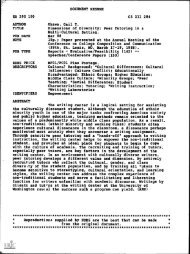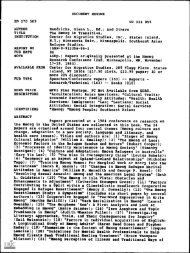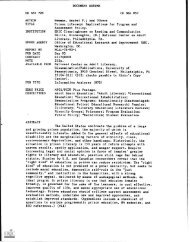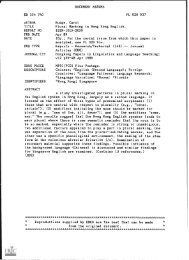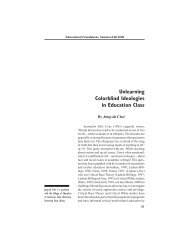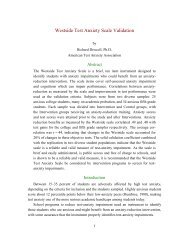Higher Education and Employment: An International Comparative ...
Higher Education and Employment: An International Comparative ...
Higher Education and Employment: An International Comparative ...
Create successful ePaper yourself
Turn your PDF publications into a flip-book with our unique Google optimized e-Paper software.
<strong>Higher</strong> <strong>Education</strong> <strong>and</strong> <strong>Employment</strong>development of education, particularly higher education, should take inquantitative terms, so as to meet the future needs for skills <strong>and</strong> avoidunemployment or underemployment.Estimates of this kind, if properly prepared, can provide such guidance.The quantitative estimates of needs for skills can be checked someyears later against actual values, so as to identify their inaccuracies <strong>and</strong> forma checklist of missing parameters <strong>and</strong> variables. They are also useful forforming a strategy for the development of the structure <strong>and</strong> organization ofthe education system.In the case of higher education the estimates are easier to make,because there is more correspondence here than at the other levels ofeducation between the skills imparted <strong>and</strong> the skills needed on the job.With regard to the problem of estimating future needs for highly qualifiedmanpower, an analysis of the match between the quantity of trained people<strong>and</strong> the types of training dem<strong>and</strong>ed by the economy, thus showing theresponsiveness of the institutions of higher education, becomes particularlyuseful. This analysis of matching brings out the shortcomings of theeducation system, not only quantitatively but also qualitatively. A carefuldiagnosis of these problems should form the basis of any future strategy forthe higher education system <strong>and</strong> provide a yardstick for achievements inrestructuring the social system through change in the educational system.Furthermore, such a diagnosis illuminates the problems encountered inpursuing the goals of socialization <strong>and</strong> equality of opportunities in the worldof work. These problems may be seer, in the various education 'paths' ofdifferent population groups, which result in the different working opportunitiesin the labour market.Identifying the factors obstructing socialization <strong>and</strong> equality of opportunitiesrequires an analysis of the population, showing their perceptions,attitudes <strong>and</strong> expectations with regard to the education system <strong>and</strong> thelabour market.<strong>An</strong> analysis of the problem of the unemployment <strong>and</strong> under-utilizationof graduates in terms of the training received <strong>and</strong> the skills needed by thejob can provide useful information for decision-making aimed at improvingthe relationship between higher education <strong>and</strong> the world of work. Such ananalysis also involves a study of the process of employment <strong>and</strong> itseffectiveness as perceived by the graduates <strong>and</strong> the employers.<strong>An</strong> institutional mechanism for interaction among the students, theirparents, the institutions of higher education, the graduates, the employers<strong>and</strong> the planners <strong>and</strong> decision-makers could also assist in improving such arelationship. A better match between the expectations (of the students) <strong>and</strong>the admission policies of the institutions of higher education could result inbetter academic performance <strong>and</strong> better socialization. This could beachieved through the design of more rational selection criteria <strong>and</strong> a bettercounselling system.Likewise, a better match between the expectations <strong>and</strong> qualifications10tom,




